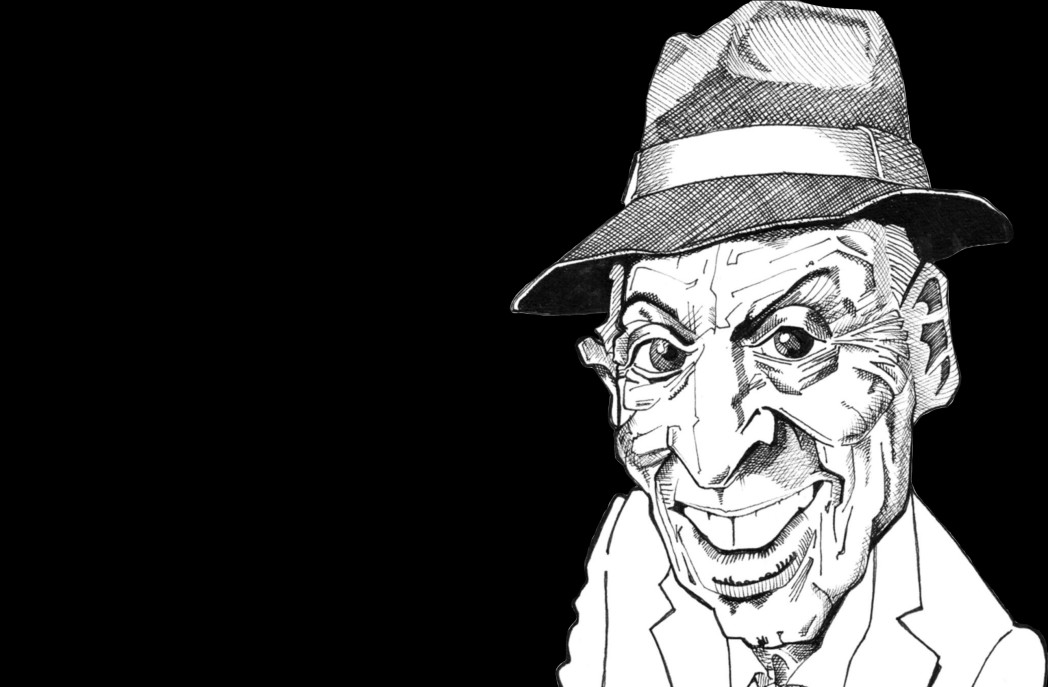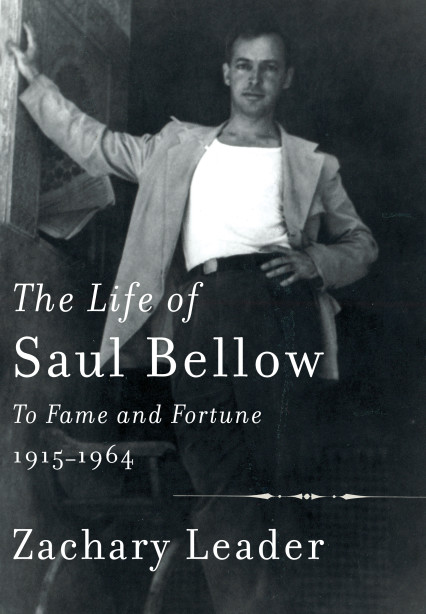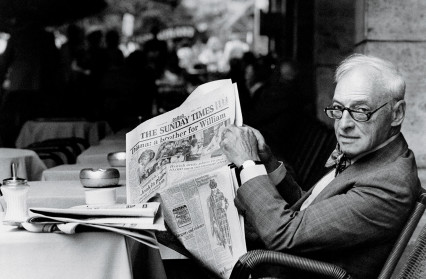The Life of Saul Bellow: To Fame and Fortune 1915-1964 by Zachary Leader (Jonathan Cape)
There is Simply Too Much to Think About: the Collected Non-Fiction of Saul Bellow ed. Benjamin Taylor (Viking)

Every great writer eventually gets the biographer they deserve. And so Doestoevsky gets his Frank, Eliot her Haight, Joyce his Ellmann. In his introduction to his long-awaited biography of Saul Bellow, Zachary Leader apparoches the subject of the nature of biography, of its unique relationship to the intellectual creative phenomenon that was Bellow, and it is Richard Ellmann to whom he turns for guidance. Leader recalls Ellmann’s acceptance speech for the 1960 National Book Award won for his biography of Joyce, defending that book’s daunting length and comparing it to his own. But not just that – Leader, like a Roman poet, places himself firmly in the tradition of Great Literary Biographer by evoking the ghosts of his spiritual forefathers. And he is right to do so.
The first question about The Life of Saul Bellow is of course its worthiness. Those creatively indebted to Bellow often mention how the works that surround his novels are as valuable as the novels themselves; his recently published collection of non-fiction There is Simply Too Much to Think About, (also released to mark his centenary year) bears the quote from Philip Roth: ‘Rare are the novelists who write nonfiction comparable in strength to their fiction. Now that the bulk of his non-fiction has been drawn together… one sees that… Saul Bellow was no less a master of the one genre than the other.’ Bellow’s Nobel acceptance speech from 1976 was for some time one of the most widely anthologised essays on the creative impulse. That collection’s same editor, Benjamin Taylor, recruits Martin Amis for a quote for the dust jacket of 2010’s Letters: ‘As in everything he wrote Saul Bellow never dipped below a certain level, and that level is stratospheric.’
Bellow was one of the most decorated novelists of the twentieth century, was a best-seller, an intellectual colossus (who in Leader’s biography is recalled as reading War and Peace at the kitchen table aged ten), and a man who demonstrated as many personal charms as he did complexities. And yet, to many of his devotees, it seemed for a while after his death he may have become as unfashionable (although not quite as unread) as a Somerset Maugham, a relic of the final days of the great galumphing literary novel with which the twentieth century became so besotted. If there is one guarantee of solidifying a legacy it is to have a formidable work contextualise and analyse, and if there is one place Bellow has been deficient it has been in the relatively uncontrollable area of the books about him. The critical works of Alan Bloom and Malcolm Bradbury aside, books about Bellow are at best unsatisfying. James Atlas’ official biography of 2000, to which Bellow himself was a party (if often a hindrance), was received lukewarm by the critics who felt it had missed a great opportunity. With Leader’s work, Atlas’ is now largely an irrelevance.
If Leader takes a paragraph early on to tackle the subject of the book’s length, it is understandable, but only in so far as the modern reader will perhaps be unused to such breadth. Joseph Frank’s Dostoesvky: A Writer in His Time stretches to five volumes in its full form, although the abridged version makes for a pocket-sized 900 pages. Leader’s 800 pages takes us up to 1964 and the publication of Herzog, the first 50 years, and what you could argue is the natural point at when Bellow moved from a post-war writer to a pre-millennial writer. If Herzog and the predecessors are concerned with how the ruling classes of intellectuals and politicians are twisting the world to their ends, then Mr Sammler’s Planet (1970) and the books that come after begin to almost cantankerously examine the next generation and their compliance with the downward spiral.
 So, The Life of Saul Bellow: To Fame and Fortune 1915-1964 presents a writer always swinging upward – he is on a curve from which creatively and critically he will never dip, but also in terms of his subject matter Bellow fills his books with protagonists who are always on the march. In the second volume, Bellow will enter the second half of his life, and the period when his characters seemed to slow down, take stock, realise – they still fumble and muse and philosophise, but they are more certain, and the reader is more certain, that they have a point.
So, The Life of Saul Bellow: To Fame and Fortune 1915-1964 presents a writer always swinging upward – he is on a curve from which creatively and critically he will never dip, but also in terms of his subject matter Bellow fills his books with protagonists who are always on the march. In the second volume, Bellow will enter the second half of his life, and the period when his characters seemed to slow down, take stock, realise – they still fumble and muse and philosophise, but they are more certain, and the reader is more certain, that they have a point.
Leader himself is a superb stylist, and the craft of the biographer – the great sense-makers of life’s eternal fudge – is melded with – one has to say – an artistry that is sometimes reminiscent of Bellow’s own work. Leader moves through Bellow’s life chronologically as you might expect, but bursting from every angle are the forward thrusts into the great novels to come. No writer, you could feasibly argue, used their own life experiences in the way Bellow did. Every inch of every novel is mined from a stretch of the ‘other life’. Leader makes this point openly at the start, and then emphasises it with his winning style. This is biography not as mission creep but as blitzkrieg. And why should a writer emerge from the shadows of their own beginnings when we already know how the story pans out? If there is to be drama in a biography then the writer needs to find another way to make it unfold. And so immediately an incident in childhood, an incident from before his birth even, is placed firmly in the fabric of later works such as Herzog or More Die of Heartbreak. The works that loom large here in these earliest years is The Adventures of Augie March (1953), which draws heavily on Bellow’s Chicago émigré upbringing, and his ‘holocaust’ novella The Bellarossa Connection (1989). But all the time, as with Doestoevksy, as with Eliot and Joyce, from childhood the novels are beginning to form their weave. Leader’s skill in making this the central theme of the work is peerless, and is the essential triumph of the book.
The complete novel-writer, Bellow is of course best understood through his own work, and Leader takes every opportunity to hand over to the man himself. But there are the expected moments of groundwork, too. Lists of the writers he read in his formative years are impressive but unsurprising. Girlfriends come and go, (as will wives later on), familial relationship have their complexities and tragedies. That he was never really able to find his footing socially or academically as a child or teenager is also not that uncommon for great literary minds, and nobody would find this a stretch for a creator of characters such as Victor Wulpy or Moses Herzog. What does impress is his breadth of intellectual engagement. The reason why Bellow’s works of finger-wagging tragi-comic denunciation of the lowly fields to which humankind was gleefully skipping before his eyes are so important, and so great, is because he absolutely understood the culture to which he turned his mind (both Imperial America’s Cold War age, but mostly that of Western ideas as a broader construct). He was immersed in the age in which he lived, not removed in an ivory tower, not a time-travelling Montagne. He takes time out, for an example picked at random from the riches of the Collected Non-Fiction, in his essay ‘Machine and Storybooks: Literature in the Age of Technology’ to dispute Arthur C. Clarke’s claim that science would eventually outlive art.
This statement by a spokesperson of the ‘victorious’ party is for several reasons extraordinarily silly. First, it assumes that art belongs to the childhood of mankind and that science is identical with maturity. Second, it thinks that art is born in weakness and fear. Third, in its happy worship of ultra-intelligent machines it expresses a marvellous confidence in the ability of such machines to overcome all the deficiencies of the real world. Such optional rationalism is charming, in a way. Put it into rhyming verse and it may sound a lot like Edgar A. Guest. Edgar felt about capitalism and self-reliance precisely as Arthur C. Clarke feels about the supertechnological future. They share a certain expansiveness, the intoxication of the winner, the confidence of the great simplifier. Mr Clarke says in effect, ‘Don’t worry, dear pals – if art is a dead end, we still have science. Pretty soon we won’t need Homer and Shakespeare, Monteverdi and Mozart. Thinking machines will give us all the wisdom and joy we want, in our maturity.
The allusion to the tendency of militant capitalists – our rulers – to see salvation always in the speedball of what is actually the major catalyst of human dissonance is a particular apposite one forty years later. And the point about technology is not a bad one either – one wonders what Bellow might have had to say about the term ‘creative industry’.
Zachary Leader’s task has been to try and find a way to unravel Bellow’s intellectual life and present it as a non-abstract linear entity. And this is exactly what Bellow did for himself in his fiction; he turned ideas into narratives. Leader proves from the first page he has the skill and intellect to do this. He spent decades on the work, and has read absolutely everything there is to examine, including the largely hopeless and work-a-day books on Bellow that have come before. And that is the thing: those writers have not been up to the considerable task, whereas Leader most definitely is. The great writer finally has his great biographer.
(image credit: Marisa Rastellini)



 Enjoyed this article? Support our writers directly by buying them a coffee and clicking this link.
Enjoyed this article? Support our writers directly by buying them a coffee and clicking this link.







